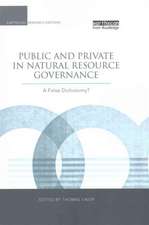The Justices and Injustices of Ecosystem Services: Routledge Studies in Ecosystem Services
Editat de Thomas Sikoren Limba Engleză Paperback – 10 iul 2013
The authors establish important new middle ground in arguments between conservationists and critics of market-based interventions such as Payment for Ecosystem Services. Neither can environmental management be separated from justice concerns, as some conservationists like to believe, nor is it in fundamental opposition to justice, as critics like to put it. The book develops this novel interpretation of justice in environmental management through analyses of prominent governance interventions and the conceptual underpinnings of the ecosystem services framework. Key examples described are revenue-sharing around protected areas and REDD+ for forest ecosystems.
The analyses demonstrate that interventions create opportunities for enhancing social justice, yet also reveal critical design features that cause ostensibly technical interventions to generate injustices.
| Toate formatele și edițiile | Preț | Express |
|---|---|---|
| Paperback (1) | 432.29 lei 6-8 săpt. | |
| Taylor & Francis – 10 iul 2013 | 432.29 lei 6-8 săpt. | |
| Hardback (1) | 1000.27 lei 6-8 săpt. | |
| Taylor & Francis – 8 iul 2013 | 1000.27 lei 6-8 săpt. |
Preț: 432.29 lei
Nou
Puncte Express: 648
Preț estimativ în valută:
82.73€ • 86.05$ • 68.30£
82.73€ • 86.05$ • 68.30£
Carte tipărită la comandă
Livrare economică 14-28 aprilie
Preluare comenzi: 021 569.72.76
Specificații
ISBN-13: 9780415825405
ISBN-10: 0415825407
Pagini: 224
Ilustrații: 10 black & white illustrations, 11 black & white tables
Dimensiuni: 156 x 234 x 13 mm
Greutate: 0.36 kg
Ediția:New.
Editura: Taylor & Francis
Colecția Routledge
Seria Routledge Studies in Ecosystem Services
Locul publicării:Oxford, United Kingdom
ISBN-10: 0415825407
Pagini: 224
Ilustrații: 10 black & white illustrations, 11 black & white tables
Dimensiuni: 156 x 234 x 13 mm
Greutate: 0.36 kg
Ediția:New.
Editura: Taylor & Francis
Colecția Routledge
Seria Routledge Studies in Ecosystem Services
Locul publicării:Oxford, United Kingdom
Public țintă
UndergraduateCuprins
1. Introduction: Linking Ecosystem Services with Environmental Justice Part 1: Ecosystem Services-based Governance Interventions 2. Justice Implications of Conditionality in Payments for Ecosystem Services: a Case Study from Uganda 3. REDD+: Justice Effects of Technical Design 4. Just Conservation? On the Fairness of Sharing Benefits 5. Basin Justice: Using Social Justice to address Gaps in River Basin Management Part 2: The Ecosystem Services Framework 6. Environmentalisms, Justices and the Limits of Ecosystem Services Frameworks 7. Health, Environment and the Ecosystem Services Framework: A Justice Critique 8. A Justice Critique of Environmental Valuation for Ecosystem Governance 9. The Justices and Injustices of Ecosystem Services
Notă biografică
Thomas Sikor is Professor of Environment and Development at the University of East Anglia, UK.
Recenzii
"The book’s lasting influence will stem from the thorough analysis and evaluation of ecosystem services in light of three dimensions of environmental justice: distribution; participation; and recognition ... This book provides a sturdy platform for taking the right course of action." – Crosslands Bulletin
"The authors of this book are social scientists describing and convincingly criticizing various types of ecosystem services-based government interventions... I would certainly recommend it to all sorts of readers" - Frederik H. Kistenkas, Wageningen University, in Ecosystem Services journal
"The authors of this book are social scientists describing and convincingly criticizing various types of ecosystem services-based government interventions... I would certainly recommend it to all sorts of readers" - Frederik H. Kistenkas, Wageningen University, in Ecosystem Services journal
Descriere
The implications for justice and injustice have rarely been explored in reference to ecosystem services. This book argues that environmental management can neither be separated from justice concerns, as conservationists like to believe, nor is it in fundamental opposition to justice, as critics like to put it.




















